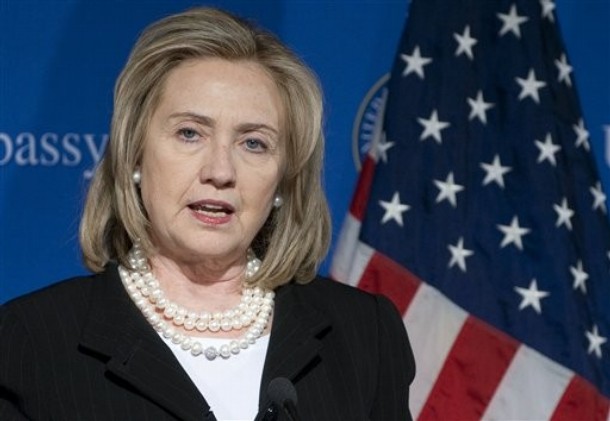France’s head start on the air war infuriated Italy’s prime minister, who accused Paris of upstaging NATO. Silvio Berlusconi warned darkly of cutting access to Italian air bases vital to the alliance’s warplanes.
“It nearly broke up the coalition,” said a European diplomat who had a front-row seat to the events and who spoke on the condition of anonymity to discuss sensitive matters between allies. Yet the rift was quickly patched, thanks to a frenzied but largely unseen lobbying effort that kept the coalition from unraveling in its opening hours.
“That,” the diplomat said, “was Hillary. . . .”
The French air attack that so angered the Italians two days later grew from French President Nicolas Sarkozy’s desire to launch an early, symbolic strike before the official start of the campaign. The White House did not object — Sarkozy had been a key advocate of military intervention, and French leadership on Libya had boosted the president’s popularity at home.
But the other allies were wary. France had floated the idea of a command structure distinct from NATO that would include some Arab countries while excluding Germany and other opponents of intervention. Italy and Turkey, meanwhile, insisted on NATO control and threatened to boycott any other arrangement.
The early French attack deepened suspicions by the two countries that Sarkozy harbored “hidden agendas,” as Turkish President Abdullah Gul later said. French officials countered that NATO was too divided and ill-prepared to move quickly enough to help the rebels.
With the alliance threatening to unravel, Clinton focused on damage control. She spent hours on the phone and in person with Berlusconi and Italian Foreign Minister Franco Frattini, who eventually played crucial roles in providing air bases as staging grounds for attacks.
The details of the military command were ultimately decided in a four-way conference call with Clinton, French Foreign Minister Alain Juppe, British Foreign Secretary William Hague and Turkish Foreign Minister Ahmet Davutoglu.
Yet even as that conflict cooled, another one was erupting.
Several Arab states, including Qatar, the United Arab Emirates and Jordan, had agreed to supply warplanes and pilots to the coalition in a symbolic show of support by Muslim countries for military action against Libya.
But three days into the bombing campaign, the Arabs appeared to be backing away, concerned by the possibility of a backlash in their own countries and angered by U.S. criticism of the Saudi-led military intervention in Bahrain to put down an uprising there. By March 24, Qatar’s four promised jets still had not yet made an appearance over Libya, and the United Arab Emirates and Jordan had announced that they would provide only humanitarian assistance.
In a bid to woo the Arabs back into the alliance, Clinton spoke at length by phone with Sheik Hamad Bin Jasim al-Thani, the Qatari foreign minister, while also making repeated calls to the UAE’s Sheik Abdullah bin Zayed al-Nahyan and to Jordan’s King Abdullah II.
“This is important to the United States, it’s important to the president, and it’s important to me personally,” Clinton told Arab leaders, according to one of the State Department officials.
On March 25, Qatari-flagged Mirage 2000 jets flew their first sorties over Libya. All three countries eventually would supply military aircraft and experienced pilots to the Libyan campaign.
Getting past stalemate
The NATO-led air campaign quickly pushed Gaddafi’s forces from Benghazi. But by May, the alliance’s planes were patrolling front lines that barely moved.
In Washington and in Europe, the word “stalemate” began to creep into opinion columns as lawmakers, skeptical of U.S. policy in Libya, began threatening to block funds for military operations there. Meanwhile, a cash crunch also loomed for the rebels, who were unable to sell oil and were legally blocked from tapping into Gaddafi’s overseas bank accounts. By early July, they had run out of money for weapons, food and other critical supplies.
Clinton, ignoring the advice of the State Department’s lawyers, convinced Obama to grant full diplomatic recognition to the rebels, a move that allowed the Libyans access to billions of dollars from Gaddafi’s frozen accounts. At a meeting in Istanbul on July 15, she pressed 30 other Western and Arab governments to make the same declaration.
“She brought everyone over at once,” said a Western diplomat who attended the Istanbul meeting.
Tripoli fell five weeks later, after a relatively small U.S. expenditure of $1 billion and with no regular U.S. troops on the ground. In the air campaign, U.S. jets flew less than a third of the missions but supplied critical support in air refueling, surveillance and logistics for sorties flown by more than a dozen other nations. (photo:
AP)

